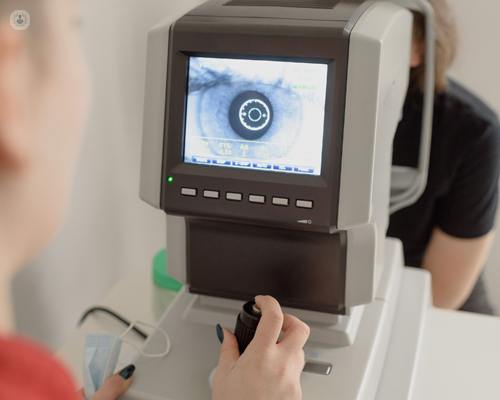Retinal vein occlusion and how it’s treated
Escrito por:Retinal vein occlusion, or RVO, is treatable. But what’s involved? We speak to renowned consultant ophthalmologist Mrs Kapka Nenova all about this, alongside it’s severity, risk factors and the symptoms.

What is RVO?
Retinal vein occlusion (RVO) is partial or total blockage of the central retinal vein, that provides oxygen and blood supply to the retina. More often it's just blockage of one or more branches and is called branch retinal vein occlusion (BRVO).
How serious is RVO?
The severity of RVO can vary from asymptomatic to severe loss of vision. When small peripheral branches are involved and the macula is not affected the condition may remain asymptomatic and undiagnosed.
When the bigger branches or the central vein are blocked, that results in a mild to severe loss of vision with permanent visual field defect. That is particularly the case when the centre of the retina called macula is affected.
What are the risk factors of RVO?
You can have a RVO without any obvious risk factors present.
People with systemic conditions like diabetes, hypertension, high cholesterol, cardiovascular disease, atherosclerosis, glaucoma, etc, are at higher risk of developing RVO, due to damage of the internal wall or narrowing of their blood vessels.
Having a control of the systemic conditions significantly reduces the risk of developing RVO.
What are the symptoms of RVO? When should you see a doctor?
Typically, the RVO is causing a sudden deterioration or loss of vision. Sometimes it remains unnoticed as the better eye is compensating and it’s found accidentally.
The sooner you see an ophthalmologist, the better chance your vision has to recover with the proposed treatment.
With small branch RVO you can have full spontaneous recovery of the vision without treatment, but observation is required.
Can RVO be cured? How is it treated?
The success of RVO treatment depends on the severity of the damage. Most of the time the treatment will achieve stabilisation of the condition and no further loss of vision.
It’s unlikely there will be late complications and poor response to the treatment resulting in further loss of vision. Despite the treatment there will be always a visual field defect that may or may not affect your vision.
There are different protocols for treatment with anti-VGF or steroid drugs administered with injection into the vitreous cavity. The effectiveness of these treatments has been proved in clinical trials and in practice over the last 10 years.
Laser treatment is not the first line of treatment and is used with debatable effect in more severe cases, not responding to the treatment with injections.
To get the best outcome with RVO treatment, you need to seek advice from an MR specialist as soon as the diagnosis is made.
If you require treatment for RVO or other ophthalmological conditions, arrange an appointment with Mrs Nenova via her Top Doctors profile.



